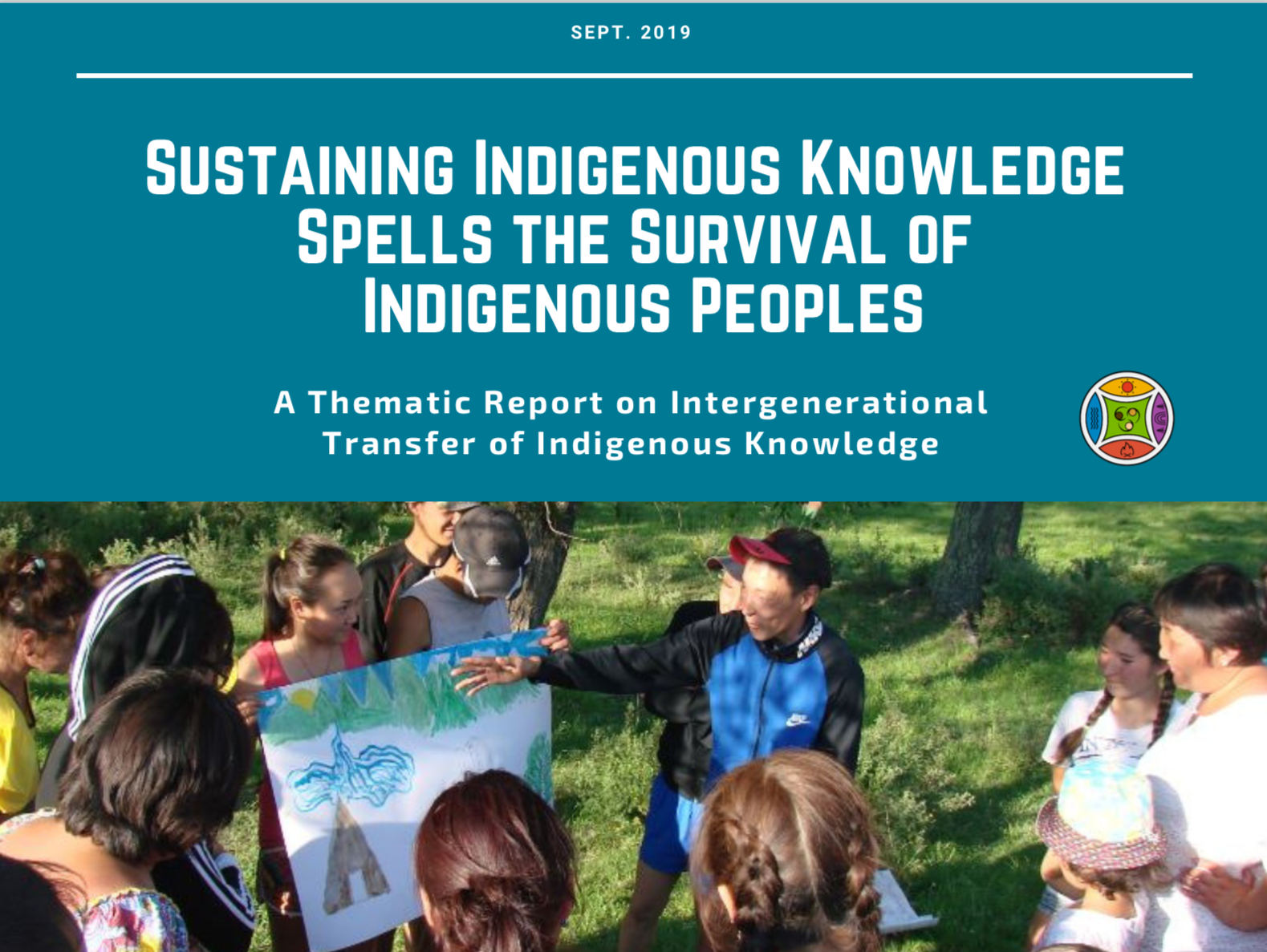Sustaining Indigenous Knowledge Spells the Survival of Indigenous Peoples
A Thematic Report on Intergenerational Transfer of Indigenous Knowledge

INTRODUCTION
With regard to the intergenerational transmission of indigenous knowledge, Article 13 of the United Nations Declaration on the Rights of Indigenous Peoples (UNDRIP) stipulates that “indigenous peoples have the right to revitalize, use, develop and transmit to future generations their histories, languages, oral traditions, philosophies, writing systems and literatures, and to designate and retain their own names for communities, places and persons.”
Indigenous youth are the current and future custodians of their lands and territories, thus mechanisms and platforms should ensure indigenous youth’s meaningful participation in decision-making affecting their future and that of their communities. Indigenous elders play a vital role in transmitting past and current observations, and their knowledge and wisdom are the reference points for indigenous young peoples’ present and future observations and their response to any impact affecting their life ways.
In the Preparatory Meeting of the Global Indigenous Youth Caucus before the 16th Session of the Permanent Forum on Indigenous Issues held in Rome, Italy in 2017, representatives of indigenous youth worldwide urged Member States to recognize the role of indigenous youth as recipients of traditional knowledge for the assertion of indigenous peoples’ cultural identity. They likewise called for Member States and UN agencies “to guarantee the control of indigenous peoples over their traditional knowledge for effective intergenerational transfer of that knowledge, without the risk of misappropriation or misuse by third parties. The use of writing, documentation, videos, and audio, particularly connected to traditional healing, plant gathering, and traditional food production, is vital for the preservation of traditional knowledge.”[1]
There are real and actual threats and challenges to the survival of indigenous peoples worldwide. Ironically, when it comes to the climate crisis, it is their body of knowledge that is contributing much to the discourse on the planet’s survival. It is indigenous knowledge which mitigates climate impacts that result in food insecurity, depletion of resources, and obliteration of sustainable practices in resource management. Were it not for centuries-old practices of knowledge transfer by indigenous peoples to succeeding generations, the decline of humankind might have happened much earlier.
Thus, the intergenerational process of transmitting knowledge from indigenous elders to youth tracks closely with changing worldviews, external and mainstream influences, environmental conditions, socio-cultural, and even economic changes. Because culture is not static, practices tested by time either adapt or run counter to present and future changes, based on what is beneficial, self-determined, and self-defined, as well as sustainable for indigenous peoples. Indigenous elders’ keen observations of the laws of nature and environmental conditions, social relationships, and community values serve as guiding signals for youth to understand and monitor changes that occur and which bear implications on their present and future survival. For instance, intergenerational knowledge transfer from elders about traditions and spirituality, customary laws and responses to climate change and other threats and challenges is a way of ensuring that future generations will have a “point-in-time reference of past and present climate and seasons.” Indigenous youth then are equipped with skills to monitor and observe changes as they take their turn to practice cultural ways of understanding their natural resources and environment, and they are empowered for advocacy and participation in their community’s concerns.[2]
At the core of the necessity to transfer indigenous knowledge to youth is the fact that they will assume the role of new knowledge bearers, with the realization that this component of culture is not static, rather deepened and expanded, allowing for changes, and follows the scientific logic that everything is in constant renewal and revision from one generation to the next. Each generation therefore “incorporates” its own acquired knowledge, enhanced practices, observations, and experiences while retaining core indigenous values and systems and their distinct cultural identity.
PAWANKA Fund has been extending institutional support to indigenous peoples’ organizations since 2015. These organizations’ efforts and initiatives are geared toward ensuring the transmission of indigenous knowledge from elders, leaders, chiefs, spiritual leaders, and healers – both women and men – to youth to encourage the latter in rediscovering and reconnecting to their roots and ancestry in these times when indigenous knowledge and culture are eroding and threatened by various forces, including technology, development projects, and globalization. Eighteen (18) projects on intergenerational transmission of knowledge sustained by PAWANKA Fund in various indigenous communities from Asia and Pacific, to Central and South America, to Africa have been successful in enabling awareness-building and community empowerment based on the connection and understanding of generations about their cultural identity and diversity.
[1] Preparatory Meeting of the Global Indigenous Youth Caucus before the 16th Session of the Permanent Forum on Indigenous Issues held in Rome, Italy in 2017. ROME STATEMENT ON THE CONTRIBUTION OF INDIGENOUS YOUTH TOWARDS A WORLD WITHOUT HUNGER 5–8 April 2017, Rome, Italy.
[2] McNamara, Karen Elizabeth and Westoby, Ross (2016). Intergenerational sharing of Indigenous environmental knowledge in the Torres Strait. Geographies of global issues: Change and threat. Edited by Nicola Ansell, Natasha Klocker and Tracy Skelton. Singapore, Singapore: Springer.463-482.
DOWNLOAD THEMATIC REPORT HERE > IndigenousKnowledgeTransferLowerVersion | IndigenousKnowledgeTransfer_HigherVersion
